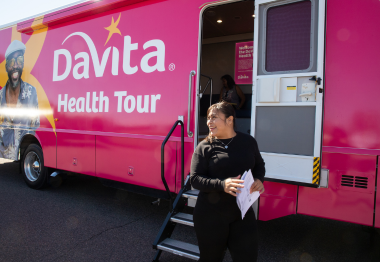Preventive Care Starts With Access: How We Can Create Solutions With Impact

BY DR. JEFF GIULLIAN, CHIEF MEDICAL OFFICER FOR DAVITA
Chronic diseases are a major health burden worldwide. And the problem is compounded in high-risk communities where socioeconomic factors — including access to care — contribute to poorer health outcomes.
In these communities, declining health can often go undiagnosed until reaching advanced stages. As a result, patient experience more complex care needs, higher costs and in many cases, lower quality of life.
This is particularly urgent for diseases like kidney disease, which can develop silently over a course of years. Because kidney disease presents few, and often no, symptoms until someone reaches kidney failure, patients miss the opportunity for preventive interventions and education to lessen the burden of kidney dysfunction.
This is where health screenings can play a transformative role. Routine check-ups allow for early detection and early management of conditions before they progress. And to bring this transformation to life, we must evaluate how we reach people with health care.
Access to quality health care should not be a luxury. Rather, it should be readily available in every community.
I am reminded of this need as this year’s DaVita Health Tour kicks off providing complimentary health screenings in underserved communities across five states.
This year, the tour will travel to high-risk communities to offer simple, and often transformative health assessments. Community members who take advantage of these health evaluations will be able to talk with a healthcare provider about kidney disease prevention, family history, and risk factors reduction. The assessments include a blood glucose and cholesterol test, a blood pressure measurement, and an obesity assessment — hitting on three leading causes for chronic illness. Individuals can also make the choice to go one step further with a blood draw that provides a snapshot of their kidney function in just 15 minutes.
Early detection through regular screenings can make a difference in chronic disease, especially in kidney health. However, early detection is only a starting point — and we have a lot of work to do to ensure that the right policies and solutions are in place to improve access to health care.
Last year, we conducted more than 1,500 free screenings — and what we learned was that the tour provided a service that many people didn’t know how to find elsewhere. One community member shared that she had been diagnosed with kidney disease but didn’t have adequate insurance coverage to support the regular follow-ups needed to manage her health. Some people shared that they had a family history of kidney disease, with loved ones dying of kidney failure, but had never talked with their doctors about their own kidney health. We discovered that an effort to provide education and awareness about kidney disease ultimately provided a way for people to check in on their health status for the first time in years.
And these connections have been a rallying force as we gear up for this year’s stops: We want to empower people as we foster a proactive attitude toward health and well-being.
The resources we provide at the Health Tour include information on how to connect with a physician or local community health program, what to consider in a kidney-healthy diet and lifestyle, and where to find a virtual or in-person Kidney Smart® class to take their kidney knowledge to the next level.
From lifestyle interventions to medication adherence, to regular follow-up care, we believe in a multi-faceted approach to addressing chronic diseases.
And it demands a united effort.
Throughout the DaVita Health Tour, we see an opportunity to connect not only with the communities we serve, but also with policymakers and leaders to advance the conversation around access to care and sustainable solutions. By working together, we can advocate for meaningful changes that promote health equity and health literacy.
As we look toward the future, we invite others to join us on this journey, to see firsthand the impact we can have when we connect with and address the needs of our communities. Only through collective action can we hope to bridge the gaps in health care access — to ensure that everyone, regardless of their background or circumstances, has the opportunity to live a healthy and fulfilling life.
To learn more and find out where the DaVita Health Tour will stop, visit DaVita.com/HealthTour.
To sign up for a screening, visit ht.screenings.com.






